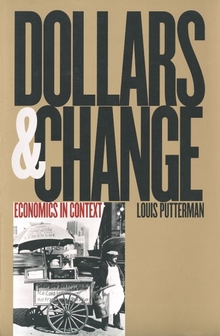Dollars and Change
WARNING
You are viewing an older version of the Yalebooks website. Please visit out new website with more updated information and a better user experience: https://www.yalebooks.com
Economics in Context
Louis Putterman
In this clear and engaging book, economist Louis Putterman places the economy and the study of economics in a broad historical and social perspective. He explores the history of the discipline, the history of the modern economy, different perspectives on the market economy, and the relations between economic matters and questions of human nature, social aspiration, and justice. Putterman connects the field of economics with other important spheres of life, building bridges of understanding that are too often absent in the study of economics.
This book explains economic ideas in nontechnical language and is accessible to readers with little background in economics. Recognizing that abstract models and theories can leave readers puzzling over the meaning and significance of economics, Putterman addresses such questions as: Why is the economy organized the way it is? Can economic efficiency and economic justice coexist? Will those who live in the world’s poor countries be able to join the well-off? Is the economy optimally arranged for maintaining the life-sustaining capacity of our planet? The author encourages readers to think more deeply and widely about economic issues and offers notes and recommendations for further reading at the end of each chapter.
This book explains economic ideas in nontechnical language and is accessible to readers with little background in economics. Recognizing that abstract models and theories can leave readers puzzling over the meaning and significance of economics, Putterman addresses such questions as: Why is the economy organized the way it is? Can economic efficiency and economic justice coexist? Will those who live in the world’s poor countries be able to join the well-off? Is the economy optimally arranged for maintaining the life-sustaining capacity of our planet? The author encourages readers to think more deeply and widely about economic issues and offers notes and recommendations for further reading at the end of each chapter.
Louis Putterman, a professor of economics at Brown University, has published extensively on a variety of economics topics.
The special website for this book is: www.yale.edu/yup/dollars
"This is an excellent book. It is lucid, carefully crafted, beautifully exposited, and contains the optimal amount of detail. I will certainly acquire a copy for myself; it contains interesting and thoughtful ideas, arguments and analysis-which I would like to read again and again. This is a book that every academic economist and student of economics should read."—Abhinay Muthoo, Department of Economics, University Of Essex
“This is a book that every student of economics should read.”—Abinay Muthoo, University of Essex
"This is a splendid project: an ambitious effort to fit contemporary economics into its broader historical, theoretical, comparative, and ethical contexts. It provides a sorely needed corrective to the stark narrowness of standard introductory economics texts, in which history is neglected, mainstream theory is portrayed as incontrovertible "science," contemporary features of the advanced industrial economies are universalized, and ethical issues are reduced to efficiency and income. . . . Not only is the concept bold, but the execution is very good. The material is sound, the presentation rigorous, and the material interesting. . . . Putterman addresses an unmet need."—James Boyce, University of Massachusetts
“An ambitious effort to fit contemporary economics into its broader historical, theoretical, comparative, and ethical contexts. Not only is the concept bold, but the execution is very good. Putterman addresses an unmet need.”—James K. Boyce, University of Massachusetts
"There is no book to compete directly with Putterman's Dollars and Change. Others may cover a few of the topics, but none cover all, and none do the job half as well."—Keith Griffin, University of California, Riverside
"There is a need for a book like this. It covers difficult topics sensibly and fairly. Instructors with very different views could use this book, adjusting the emphasis as required for their own lectures and discussions."—Richard Langlois, University of Connecticut
“An appealing book for use in undergraduate economics programs, and one without a close competitor.”—Vernon W. Ruttan, University of Minnesota
“Putterman has been influential in the rising community of economists who study the roles of social norms and values in economic life, asking hard-to-answer but deeply important questions about how the tastes and preferences that constitute our character come to be what they are. Here he tackles the question of where the economy and our understanding of it ‘come from’—their historical, cultural and ethical contexts.”—David Warch, economicprinciples.com
“The key issue is whether the author is able to stimulate students about economics. . . . My impression is that he has succeeded admirably. The author has found a market niche to be filled and, in the spirit of a Schumpeterian entrepreneur, has done it.”—Frederic Pryor, Journal of Economic History
“Places the tools and concepts of economics in a broader context and addresses important questions relating to the economy that are not directly and clearly treated by standard economics textbooks.”—Journal of Economic Literature
“This book offers a supplement to the core teachings of an introductory course in economics. It covers topics students are curious to know but which the curriculum of abstract ideas in mathematical or graphical models does not cover.”—Anna J. Schwartz, The Key Reporter
"This book is useful primarily as a supplementary text for introductory economics classes, but it is broader in scope than other such ancillary texts."—Louis Putterman, Review of Radical Political Economics
ISBN: 9780300087109
Publication Date: January 11, 2001
Publication Date: January 11, 2001
304 pages, 6 1/8 x 9 1/4


